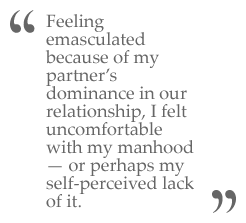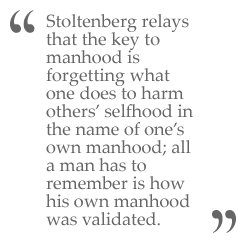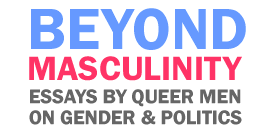|
 My
journey into feminism and understanding my own
manhood began late in my undergraduate career. I
remember my junior year of college, sitting in a
class on gender and language. It was a tumultuous
time in my life; I was dating a woman for over two
years and was dissatisfied with most aspects of the
relationship: the use of my social time, our sexual
relationship, the way we argued, my inability to
communicate my feelings or needs, her domination of
the relationship. Feeling emasculated because of my
partner’s dominance in our relationship, I felt
uncomfortable with my manhood — or perhaps my
self-perceived lack of it. With my personal baggage
about gender, I wasn't very comfortable in this
course. My
journey into feminism and understanding my own
manhood began late in my undergraduate career. I
remember my junior year of college, sitting in a
class on gender and language. It was a tumultuous
time in my life; I was dating a woman for over two
years and was dissatisfied with most aspects of the
relationship: the use of my social time, our sexual
relationship, the way we argued, my inability to
communicate my feelings or needs, her domination of
the relationship. Feeling emasculated because of my
partner’s dominance in our relationship, I felt
uncomfortable with my manhood — or perhaps my
self-perceived lack of it. With my personal baggage
about gender, I wasn't very comfortable in this
course.
During the same term, I wrote a (rather bad) poem
for a writing class I was also taking. It began:
my women's studies class is interesting
because all the women act like men
and all the men act like women
not that i'm to talk
i'm pretty feminine myself
but some of these men
refuse to call themselves men
as if they're making some grand statement
about to change the world
I
was obviously indignant toward my male classmates
who expressed discomfort with identifying as a man.
At the time, I identified as a feminist, but I had
no idea how to enact my feminism in my everyday
life, or what it meant for my manhood — and my
understanding of gender even more so. I concluded
the above poem: "but at least i know i'm a man /
with a penis waggling between my legs." While I
didn’t ascribe to all the rigid rules of manhood, I
felt that there were still boxes we had to fit in,
and foremost among them was identifying as either
man or woman, and making sure this identification
matched one’s physical sex.
It
wasn't until recently that I began to understand
more fully what manhood really stands for (though I
don’t think I yet understand gender completely). In
The End of Manhood, John Stoltenberg tells
the story of Tom, who isn't sure what manhood means.
Tom always felt compared to other men, and he isn't
sure what the "stuff" that other men have more of
than he. He begins to ask other men whom they feel
compared to — who has more of this "stuff" — and
eventually, he figures out who has the most "stuff.”
He goes to the swamp to meet this manly man: Deep
Bob, "a massive hairy creature [that] rose up out of
the goo, slime sheeting down its matted fur" (31).
Deep Bob ironically turns out to be the tooth fairy,
who only acts as Deep Bob part-time. Manliness for
Deep Bob is a public façade, a part-time job that
does not encapsulate who he truly is. The lesson of
Deep Bob is that manhood is an act, a performance.
 Stoltenberg then tells his own story of growing up.
He explains that either he was compared to other men
who had more "stuff" than he (and he was picked on
by those men as well), or he had to "pass" — that
is, convince others that he had those qualities of
being a man, but not really convince himself. He
wound up picking on his little sister in order to
feel manlier. As he tries to recount this story as
an adult, he talks to his sister and realizes that
he does not remember as much about his taunting and
teasing as she does. He concludes, "The one who is
making up the manhood has to forget a lot that goes
into the legend of one's gender” (35). Stoltenberg
relays that the key to manhood is forgetting what
one does to harm others’ selfhood in the name of
validating one’s own manhood; all a man has to
remember is how his own manhood was validated. Stoltenberg then tells his own story of growing up.
He explains that either he was compared to other men
who had more "stuff" than he (and he was picked on
by those men as well), or he had to "pass" — that
is, convince others that he had those qualities of
being a man, but not really convince himself. He
wound up picking on his little sister in order to
feel manlier. As he tries to recount this story as
an adult, he talks to his sister and realizes that
he does not remember as much about his taunting and
teasing as she does. He concludes, "The one who is
making up the manhood has to forget a lot that goes
into the legend of one's gender” (35). Stoltenberg
relays that the key to manhood is forgetting what
one does to harm others’ selfhood in the name of
validating one’s own manhood; all a man has to
remember is how his own manhood was validated.
In
the epigram at the end of this realization,
Stoltenberg writes:
TO KNOW WE REALLY HAVE MANHOOD,
WHATEVER THAT CAN MEAN,
WE HAVE TO DENY SOMEONE ELSE'S SELFHOOD—
OVER AND OVER AGAIN. (36)
As
the oldest brother of three, I've started thinking
about the ways we picked on each other and fought.
With just three and a half years between my youngest
brother and me, we fought and roughhoused a lot.
I've often attributed this to our relative proximity
in age and to "boys will be boys."
But now, after immersing myself in feminist theory,
I have begun to wonder if this is true. Riding on
the bus was a humiliating experience, and it was
embarrassing to see my littlest brother picked on as
well; once off the bus, I'd turn on my little
brother and release my rage on him. As a victim of
bullies on the bus, I didn’t feel strong enough or
man enough. I realize now my frustration during this
time had to do with my own naïveté about how to be a
man (a bully). I was even angrier that my brother
was even more naïve. I had no idea how to express my
frustration except by showing him that I knew more
about manhood than he did — through striking out
physically against him. I was like the bullies on
the bus; if my brother didn’t know the codes of
manhood, I had to show him.
In
high school, as I began to socialize less with my
brothers and more with my friends, I noticed the
competition had moved from those I had to
live with to those I chose to hang out with.
My male friends would regularly compete: who was the
better basketball player; who had sex more or had a
girlfriend; who hit harder; who was willing to drive
fastest; who had the coolest car. One friend was
constantly teased because he was smaller than the
rest of us and a bit of a “neat freak.” We tormented
him with taunts, mocking his feminine desire for
tidiness and his short stature. In our eyes, he was
“gay,” and we let him know it. I was one of his
worst tormenters, despite our close friendship, and
ironically, I was even afraid that he really was gay
and would eventually hit on me. I had internalized
at this point, though at a subconscious level, that
being a man meant being straight.
|




4 COMMENTS ON THIS ESSAY:
I just finished writing an essay about how wonderful this essay is. It's so modern and amazing. This is the best essay I have ever read. Is there more to read by Michael Faris? I would love to read more of his work.
Beautifully written, concise, and enjoyable to read. Thank you very much for this.
Really beautiful essay. An amazing message on how it would great if people could just accept others for who not what they are. Spot on about the way traditional masculinity is too often expressed by victimizing the 'other'.
I grew up in the south in the 50's and 60's so I know a lot about being picked on and bullied. I knew I was different from everyone else and couldn't understand why I was so disliked, everyone seemed to know but me, I liked more femminine things back then and when I finally opened that closet door when I was 17 it was like a whole new great world opened for me I could look people in the eye, hold my head up and was proud of myself I moved to New york and got in touch with myself and because of my life I had a much more intersesting life than all those small minded bigoted people I left behind I wish I had known someone like you , it would have made growing up a lot easier Just remember hold your head up and be proud of your unique self.